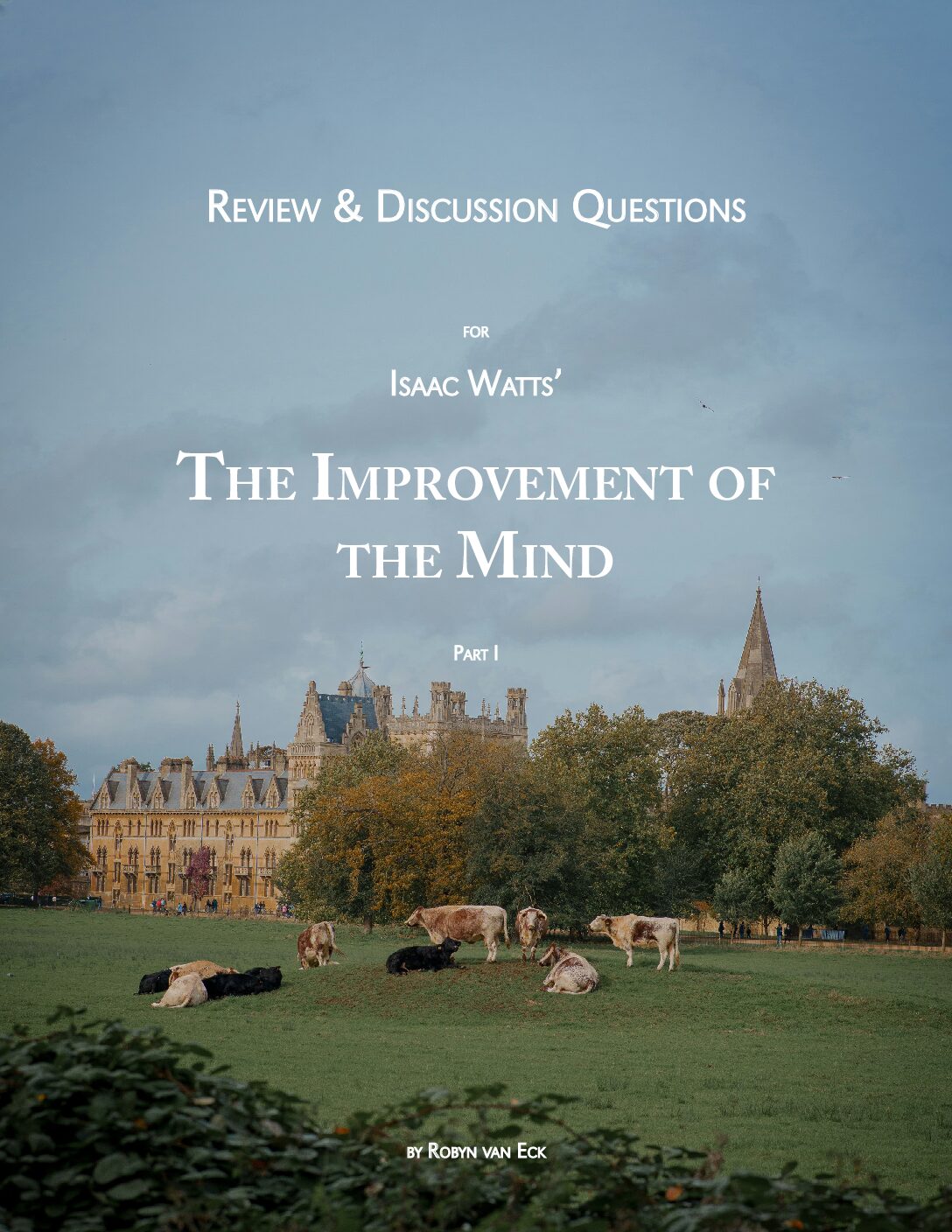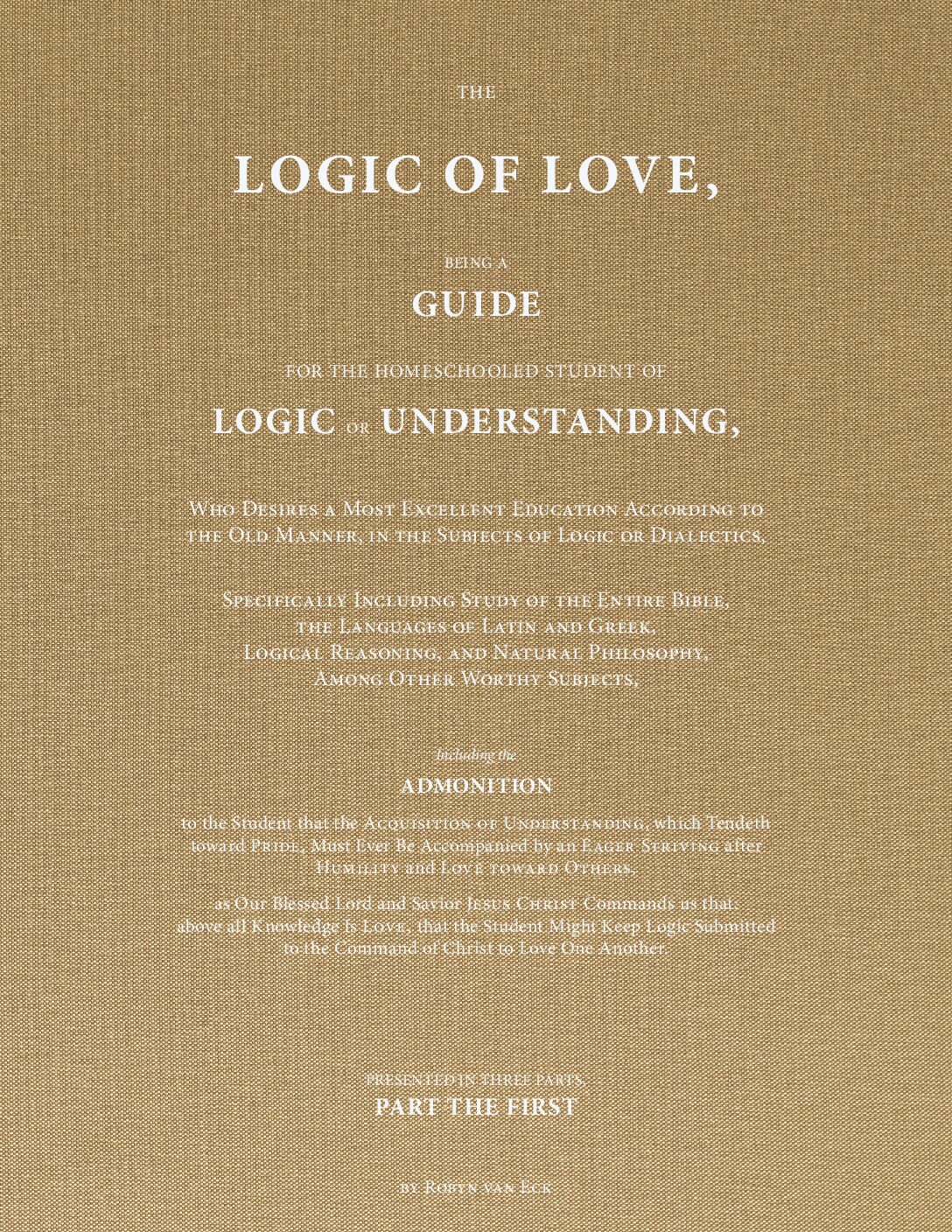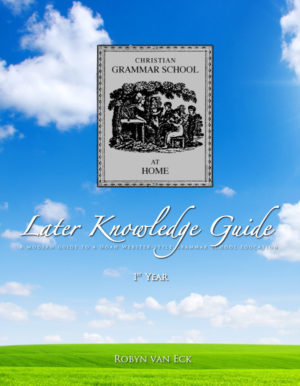“Trust to thy heart.” —Longfellow, Evangeline
The more my older children and I interact with young Christian homeschoolers, the more my heart is saddened to find that when they are not discussing explicitly biblical ideas, many think like pagans.
What I mean is, if you ask these sweet young people about the Bible or God, they usually have the right answers. But if you ask them questions about right and wrong in difficult circumstances, their ideas are dark and confused, and when you try to help them shine light on their ideas and discover truth, they reject it and cling to their cloudy, disordered, and mostly wrong ideas.
Many years ago, I started realizing that the “good and wholesome” curriculum I’d been taught in school, mostly through my English classes, was actually subtly undermining my Christian faith. So I determined to cut all of those treacherous books out of my children’s curriculum; I’ve written extensively about that in the past.
There are no two ways about it. If we give our children the “classic” books to read, which are written—one and all—with a designed goal to lead children to reject the true God, our children will end up horribly confused.
I wish I could cry from the mountaintops: Stop listening to the “experts”!
But then why should you trust me? Couldn’t I just be lumped in with the “experts”, too?
So I offer you an opportunity to dig into this question for yourself, with a time commitment of only about 2-3 hours. I think you’ll find this little exercise well worth your time.
Longfellow’s Evangeline provides an excellent opportunity for Christian homeschooling parents to do a shallow-yet-deep dive into literature studies, for the sake of evaluating what sort of literature they want for their children’s education. It is short and sweet. It is far more wholesome than most of the books on Christian literature lists, yet in all of the sweetness and beauty, Longfellow has planted a deadly poison.
If you have never read it before, I suggest you read Evangeline. As I said, it is short—it only takes about 2 hours to read. You can even find it read aloud on LibriVox and YouTube. When you read it for yourself, this analysis will make more sense. (I won’t go into explanation about Evangeline, to keep a long article from growing even longer.)
This will be a longer article than usual. It is a brief Christian Worldview analysis, and is mostly taken directly from the upcoming Rhetoric for Reformers: Wisdom 1 Studies guide.
But although it is a little more intensive than our usual articles, I think our discerning Christian homeschooling parents will find it worth the deep dive, for the sake of giving us really concrete ideas about what we are striving for, when we speak of Christian education, or a Christian curriculum.
Beautiful Writing.
The poem is very beautifully written. The rhythm of the poetry, the richness of the language, the way the author uses language to create feeling for the listener as he tells the story… it is very well done.
History.
The history in this tale is very interesting, and I think it may have been referenced by the founding fathers of the United States in the Declaration of Independence (the actual history, not Longfellow’s historical fiction). It is worthwhile to learn the story of the Acadians, later called the Cajuns. It certainly sheds light on the sort of nation (Great Britain) with which the American colonists were forced to sever ties.
Very Sweet and Wholesome.
Almost the entire book is wholesome and sweet. So most Christians think this is a lovely example of good literature.
Similar books: Little Women, Anne of Green Gables, The Secret Garden, A Little Princess, Tom Sawyer; the poetry of William Blake (as “The Lamb” and “The Tyger”), Emily Dickinson, etc.
Romanticism.
But there is a very big problem—this book is written in the Romantic worldview. The Romantic worldview hearkens back to the pagan Romans. Instead of the Christian worldview, in which we are taught to take our thoughts captive to the obedience of Christ, and seek truth above all—which is always rational—, the Romantic worldview emphasizes feelings. For example, love is not a command to be obeyed, but instead a sort of pitfall one “falls” into. It cannot be helped or controlled whom one loves; the feelings are the supreme arbiters of right and wrong.
Hence, though Evangeline and Gabriel are parted, Evangeline is right to waste her entire life trying to find her youthful love again. The Bible says that she should settle down and get married, if God provides that opportunity. But in the Romantic worldview, feelings—especially tragic feelings that will only lead to sorrow—must be obeyed. Notice that Gabriel never searches for Evangeline. Longfellow closes the story by giving Evangeline a bittersweet satisfaction, but without any of the joy and fulfillment she’d been longing for all her years.
Greek Tragedy.
In The History of the World MegaConference, which I highly recommend, one of the lecturers teaches about the influence of Greek Tragedy on our modern society, and this is the form you see in Longfellow’s Evangeline. Just like in Romeo and Juliet, there is a prophecy early in the tale portending doom to the “star-crossed lovers”, and no matter how they try to overcome their doom—and especially as a result of their efforts to avoid their doom—the doom still comes, to their sorrow.
The Greek Tragedy is softened by a bit of Christian Worldview in Longfellow. For example, in the pagan writings (and in Shakespeare), there will always be a witch (oracle, prophecy, etc.) at the beginning of the tale who foretells the doom which will occur to the protagonist. In Longfellow, he does not use such a heathen device in his storytelling—his writings would have been utterly rejected by the pious Christian readership of the United States if he had! Instead, Evangeline’s heart tells her that her quest will end in failure. But this is still the Greek tragedy form. Another example of how Longfellow softened the Greek tragedy form is that he has the characters participate in Christian religion, and the gods who are directing the action are supposedly the one true God. But again, the true God does not operate like the pagan Greek gods—capriciously causing trouble and disorder to no higher purpose.
On the other hand, if John Bunyan had written this, I imagine Evangeline would have mourned her loss, prayed for wisdom, listened to the Bible about how young widows should remarry, and happily received a suitable marriage proposal in due time. She would have borne children and lived to see her grandchildren. Though she had suffered wrong at the hands of wicked men, she would have found that God brought greater joy to her, even through the suffering.
But in the Greek tragedy, the sufferer just goes on suffering, and the only end is death.
Religion.
Speaking of a false god being called the Living and True God… The priest is supposed to stand as the voice of God for Evangeline. When the priest speaks, that is the counsel of God to her.
The only problem is that practically everything the priest says is wrong! The very worst is the heart of the book, in Part the Second, Canto I:
Then would they say, “Dear child! why dream and wait from him longer?
Are there not other youths as fair as Gabriel? others
Who have hearts as tender and true, and spirits as loyal?
Here is Baptiste Leblanc, the notary’s son, who has loved thee
Many a tedious year; come, give him thy hand and be happy!
Thou are too fair to be left to braid St. Catherine’s tresses.”
Then would Evangeline answer, serenely but sadly, “I cannot!
Whither my heart has gone, there follows my hand, and not elsewhere.
For when the heart goes before, like a lamp, and illumines the pathway,
Many things are made clear, that else lie hidden in darkness.”
Thereupon the priest, her friend and father confessor,
Said, with a smile, “O daugher! thy God thus speaketh within thee!”
Here is the substance of Longfellow’s message, at the center of the book; it is the message of virtually all of the 19th century Romantic authors and poets—that the heart, and not the Bible, should rule our lives.
The heart!
“The heart is deceitful and wicked above all things.”
These books have a beautiful cover on them of innocence—by portraying innocent characters who only act according to kindness and goodness. These books have a wholesome cover on them of sweetness—by picturing Christian communities living in harmony, industry, and faith. But the heart of these books is well-hid, and at the heart these “good” books teach the most deceitful of lessons, while feigning to teach Christian truth.
Follow Thy Heart.
Another example, from Part the Second, Canto I:
Still in her heart she heard the funeral dirge of the ocean,
But with its sound there was mingled a voice that whispered, “Despair not!”
And in Part the Second, Canto II, Father Felician says,
“Daughter, thy words are not idle; nor are they to me without meaning,
Feeling is deep and still; and the word that floats on the surface
Is as the tossing buoy, that betrays where the anchor is hidden.
Therefore trust to thy heart, and to what the world calls illusions.”
So now you know that our Christian culture has been subtly being trained in the satanic dogma of follow your heart for two hundred years. This is a prime example of the literature of the 19th century, which not only had a big impact on the 1800s, but has been taught to generation after generation ever since. Christian educators today trust to their own training, so they teach these books to the next generation, calling them good and beautiful.
Names.
We’ll say a bit more about this below, but for now notice that Father Felician is the father figure to Evangeline, and the voice of God to Evangeline, and his name is that of happiness (felicity). He is the one to guide Evangeline to happiness. And he is the one who consistently counsels Evangeline to obey her feelings and the voice of her heart.
Her feelings, and her heart, will lead her to happiness.
Transcendentalism.
Transcendentalism was the fashionable false religion of intellectual northerners in the United States in the mid-1800s. Many of the authors featured in typical curriculums (yes, even the Christian curriculums) were Transcendentalists. Compared to the crazy post-Christian ideas of today, the Transcendentalists seem very sweet and Christian. But they were absolutely rejecting the one true God.
They would speak of “God”, but their god was not the Triune Father, Son, and Holy Spirit. They had some idea of right and wrong, but their ideas of right and wrong were defined by their hearts, and certainly not the Bible. They would write books in which the characters went to church and performed Christian duties of piety toward God and virtue toward their fellow man, but the actual Christian God actually didn’t exist in the “universe” of their books; the “God” in these books was only a friendly sort of fairy godmother who might or might not exist—he existed as far as it enabled the characters to display their goodness by showing piety toward him, but he never took action in the story.
When reading a book, you should always ask, “In this story the author has created, does God exist? Is He ruling? Is He righting wrongs? When the characters die, will they immediately stand at the judgment seat of Christ, at which an eternity of either heaven or hell awaits? Does God actively work in this story?”
Most of the books you find—most of the books in literature courses, yes, in the Christian curricula, too—are written in such a way that the author has created a world after his (or her) own liking—a world that looks just like our world, except that it is exactly the way the atheistic author wants to pretend our world is—it is a world in which we do not have to answer to our Creator, because the true God does not exist.
In these books, the goal of the characters is self-fulfillment or self-discovery. Even if the characters serve others, it is only to demonstrate how good and worthy this character is, and not because our God loved us so much that He served us—even to the death of the cross—and therefore we serve others out of love for the God who loved us so much, though we are absolutely unworthy of His love.
Evangeline.
Finally, notice Evangeline’s name. Just like the masculine version, Evangel, Evangeline means bringer of the gospel.
What gospel is Evangeline bringing to Longfellow’s readers?
Just an Introduction.
As a student and young adult, I spent twenty years reading books like this. Compared to the darker “classics” we were told to read, such as The Red Badge of Courage, Roll of Thunder, Hear My Cry, Where the Red Fern Grows, White Fang; then the Brontë sisters, Edgar Allen Poe, and F. Scott Fitzgerald; and then Faulkner, Hemingway, and Salinger; not to mention all of the poets like Dickinson, Frost, Burke, Wordsworth, Yeats, Keats… And don’t even get me started on The Crucible and The Scarlet Letter! I could go on and on… Compared to the darker “classics” we were given to read, Evangeline seems wonderfully sweet and Christian. Yet it plainly teaches students to believe that their feelings are the ultimate authority they must obey—without the students ever realizing they are being taught this!
These authors, so familiar to Christian curriculum literature lists, either hint that God isn’t real, simply ignore Him and act like He isn’t real, or outright deny that He is real.
These are not the ideas that help us. In any way.
Reading Evangeline is a great discernment exercise, but also an example to show us why the literary education in Grammar of Grace and Christian Trivium Publishing is so radically different from (probably) what most of your friends are giving to their children. This is not to puff us up with pride, or to make us think that leading our children to Christ will be a cinch—no, I’m afraid the danger lies within our children’s very hearts, and we must diligently teach our children about the Lord, and pray earnestly for the Holy Spirit to do the work we cannot.
But I hope this exercise might provide you with some solid evidence, and some encouragement, for those of us who are attempting to do something radically different—something hard!—in our age.
Oh, may the Lord help each of us to in our efforts to “teach them diligently”!
Thanks for dropping by; please keep us in prayer!
Recommended Resources
-

Grammar of Grace
Price range: $98.00 through $148.00 Select options This product has multiple variants. The options may be chosen on the product page -

Review & Discussion Questions for Isaac Watts’ Improvement of the Mind
Price range: $24.00 through $32.00 Select options This product has multiple variants. The options may be chosen on the product page -

The Logic of Love: Understanding 1
Price range: $45.00 through $60.00 Select options This product has multiple variants. The options may be chosen on the product page



Christina Villegas
Hello Robyn, thank you for this wonderful insight.
The Lord’s mercy and grace be multiplied upon you and your family during this season. We love and miss you all very much!
Ananda Barton
Interesting. I’m just reading ‘Poems by Henry Wadsworth Longfellow,’ published in Boston 1866.
The problem is though, without pagan influence, Western culture would not exist.
Western Civilization is based on a fusion between Greek, Hebrew and Roman cultures, i.e. a mix of pagan and theistic world views. In many ways this is what distinguishes our civilization from its rivals, we are a mix of three cultures, the piety of the Hebrew, the aestheticism of the Greek the discipline of the Roman*.
When the three are in harmony, as during the High Middle Ages or the Victorian era, Western society is at one of its peeks, we produce great works of art, great social and technological progress and great saints.
When they are out of harmony our civilization stumbles. When the Hebrew is dominant we get Cromwell, when the Roman Mussolini, when the Greek, what we have today, moral disorder leading to catastrophic loss of confidence.
That, of course, isn’t to say that all aspects of modern culture are negative, I’m glad I live in an age where gay men don’t fear arrest and Aboriginals have citizenship (not to mention modern dentistry). However there is no doubt that we live in an shockingly shallow and hedonistic society that badly needs both the Hebrew and the Roman to stiffen it.
While I sympathize with your concerns Christianity is only one strand in the rope of Western Civilization, though a vital strand. Without the pagan aspect our culture would not be Western, making it impossible, and I think undesirable, to exclude the non-Christian.
*This also makes Western Civilization far more able to absorb non-Western influences, Buddhism, for example, has been incorporated, more or less without trauma, into many Western societies.
Robyn Van Eck
Thank you so much for the thoughtful comment! I think there are a lot of people who would agree with your perspective! I have become convinced of a different way of looking at this question, however. Although there are lots of differences in the various pagan civilizations, the Bible teaches that they are all fundamentally alike, in that they follow the doctrines of demons, which lead only to futility, death, and degradation (sooner or later). The thing that has made Western Civilization so completely different from all of the rest of the world civilizations, I believe, is not the Greek and Roman influences, but the fact that so many Greeks and Romans became Christians, such that a large number of their people had the Spirit of God himself dwelling inside of them, giving them insight and wisdom, and keeping them from evil.
The idea that the ancient pagan Romans and Greeks were fundamental shaping influences of Western Civilization is a relatively new idea, from the Progressive Era, when there was a major undertaking by book publishers and education elites to re-write history, intentionally writing the influence of Christianity out. I was certaintly taught that view. I later came to understand that, rather than Roman and Greek influences being fundamentally important shaping forces of Western Civilization, on the contrary it was because *Christianity was rooted in ancient Roman and Greek cultures* that the things about their cultures which did survive, did.
So I would absolutely agree that our culture has been greatly impacted by the vestiges of our pagan ancestors’ cultures. Our tradition of the groom carrying the bride over the threshold is a tradition 3,000 years old, from the Romans’ kidnapping women and making them their wives, for one of countless examples! But the things that survived were either Christianized, or survived because they were the good parts of those cultures – and the same would just as well happen in India or China if (when, I trust!) Christianity takes root in those lands, over the course of thousands of years.
The superficial things of their cultures will survive; but the great advancement and civilization that would be achieved in those lands once Christianity became the dominant religion would be due to the Living God blessing the people who fear and serve Him. The Lord actually is God, and He actually is at work throughout the earth, and people who are acting in accordance with the Creator who made them, live lives that *fulfill the purpose for their creation*. And God, being a Good God, does lots of good through them.
In other words, the Greek and Roman pagan influences on Western society I view as superficial influences, whereas the fundamental thing that made Western Civilization so completely different and better from the other world civilizations is Christianity, and more specifically, the Living God indwelling Christians. I hope that helps explain this Christian Worldview perspective from which I was writing!
Added note. Without making it a very long reply, I would mention that I have a different analysis of the examples you brought forth; I’ll give a couple of specifics: I would say that the period of British history under Cromwell’s leadership was the best time that nation ever enjoyed, and my perspective is that incorporating Buddhism into Western societies has been an unmitigated disaster and caused eternal tragedy for an untold number of souls. (Some Cromwell reading that might be interesting: https://www.grammarofgrace.com/wp-content/uploads/2025/12/Encyclopedia-Britannica_Oliver-Cromwell.pdf ?)
I hope that offering these perspectives might be helpful to you or to other readers. I’m truly thankful for your thoughtful comments, and wishing you all the best!